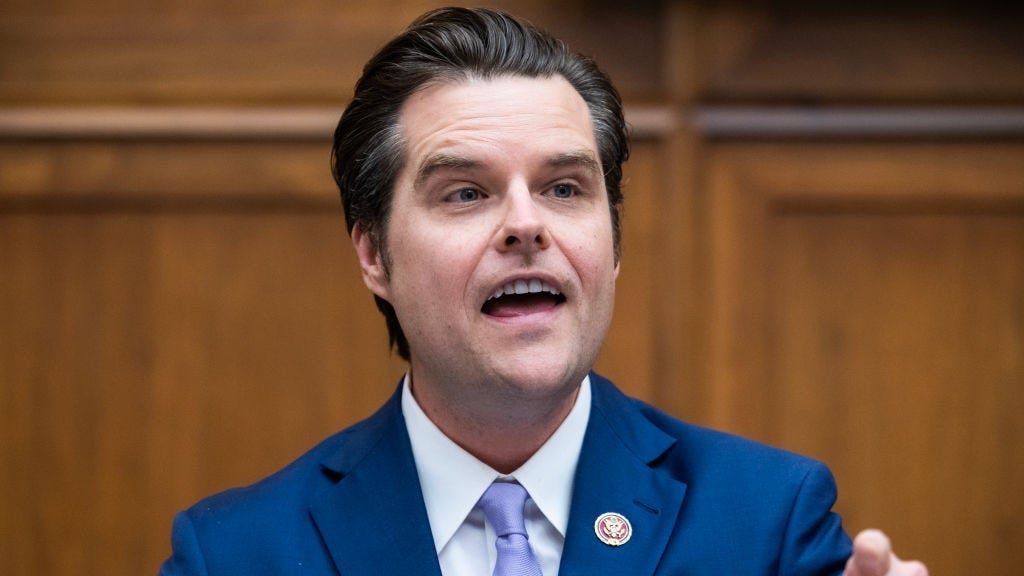Former Congressman Matt Gaetz is embroiled in a legal battle to prevent the release of a House Ethics Committee report detailing allegations of misconduct during his time in office. Gaetz, who resigned from Congress shortly after being nominated for Attorney General by then President-elect Trump (a nomination he later withdrew), preemptively filed a lawsuit in federal court arguing that the committee lacks jurisdiction over him as a former member. The lawsuit alleges that the committee’s continued investigation and impending report violate his due process rights and established procedural protections. Gaetz contends that the report’s findings are false and factually incorrect, emphasizing that he has never been charged with any crime related to the allegations, which include sex with a minor and illicit drug use. He argues that the release of the report would irreparably damage his reputation and professional standing, given the official nature of the document and the expected widespread media coverage.
The core of Gaetz’s legal argument rests on his resignation from Congress. He asserts that the House Ethics Committee’s jurisdiction extends only to sitting members and that their continued pursuit of the investigation after his resignation constitutes an unprecedented overreach. The complaint highlights the lack of proper notice or disclosure to Gaetz regarding the committee’s continued actions, emphasizing the potential violation of his constitutional rights. Furthermore, Gaetz claims that the committee’s intended release of the report, despite acknowledging their lack of jurisdiction, represents a departure from established procedural norms and a threat to fundamental constitutional protections. The lawsuit seeks to permanently block the release of the report, arguing that no adequate remedy exists to rectify the damage that would be inflicted upon his reputation if the allegations were made public under the official imprimatur of the House Ethics Committee.
The anticipated report, potentially slated for release, stems from a multi-year investigation into Gaetz’s conduct. The allegations, which Gaetz vehemently denies, involve serious accusations of sexual misconduct with a minor and illicit drug use. Gaetz has consistently maintained his innocence, stating publicly that he has never had sexual contact with anyone under the age of 18. He further asserts that the “witnesses” relied upon by the committee are the same individuals deemed non-credible by the Department of Justice. The sudden halt to the investigation following his congressional resignation, coupled with his subsequent withdrawal from the Attorney General nomination, adds a layer of complexity to the unfolding legal drama.
Gaetz’s public statements have oscillated between declarations of complete exoneration and admissions of potentially embarrassing, albeit not criminal, behavior. Following the committee’s vote to release the report, Gaetz posted on social media, claiming full exoneration and emphasizing the lack of any charges against him, even for campaign finance violations. He pointed to the alleged bias of the investigators and criticized the process, stating he has never had the opportunity to confront his accusers or challenge their claims. In subsequent statements, Gaetz acknowledged past behavior that he characterized as “partying,” “womanizing,” and excessive drinking and smoking, which he attributes to his younger years and a different lifestyle. While acknowledging that such behavior might be embarrassing, he insists it was not criminal.
The potential release of the House Ethics Committee report represents a significant juncture in this ongoing controversy. Gaetz’s preemptive lawsuit, aiming to block the report’s publication, raises crucial questions about the committee’s jurisdiction over former members and the balance between transparency and due process. The report’s contents, if released, could have far-reaching implications for Gaetz’s reputation and future prospects, regardless of whether any formal charges are ever filed. The lawsuit highlights the potential tension between the public’s right to know about the conduct of elected officials and the protection of individual rights, particularly in the absence of formal criminal charges.
The clash between Gaetz and the House Ethics Committee underscores the complex and often contentious nature of congressional ethics investigations. The committee’s decision to proceed with the report’s release despite Gaetz’s resignation and his subsequent lawsuit creates a legal and political battleground. The outcome of this lawsuit will likely have significant implications for future congressional ethics investigations and could potentially set a precedent regarding the committee’s authority over former members. Moreover, the case highlights the challenges inherent in balancing the need for accountability and transparency with the protection of individual reputations and due process rights, especially in cases involving sensitive and potentially damaging allegations. The court’s decision will ultimately determine whether the public interest in the report’s contents outweighs Gaetz’s claims of jurisdictional overreach and potential reputational harm.

